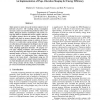Free Online Productivity Tools
i2Speak
i2Symbol
i2OCR
iTex2Img
iWeb2Print
iWeb2Shot
i2Type
iPdf2Split
iPdf2Merge
i2Bopomofo
i2Arabic
i2Style
i2Image
i2PDF
iLatex2Rtf
Sci2ools
131
click to vote
IPPS
2007
IEEE
2007
IEEE
An Implementation of Page Allocation Shaping for Energy Efficiency
Main memory in many tera-scale systems requires tens of kilowatts of power. The resulting energy consumption increases system cost and the heat produced reduces reliability. Emergent memory technologies will provide systems the ability to dynamically turn-on (online) and turnoff (offline) memory devices at runtime. This technology, coupled with slack in memory demand, offers the potential for significant energy savings in clusters of servers. However, to realize these energy savings, OS-level memory allocation and management techniques must be modified to minimize the number of active memory devices while satisfying application demands. We propose several page shaping techniques and structural enhancements to proactively and reactively direct allocations to a minimal number of devices. To evaluate these techniques on real systems, we implemented these shaping techniques in the Linux kernel. Experiments using our OS extensions coupled with a simple history-based heuristic (to track dem...
Distributed And Parallel Computing | Emergent Memory Technologies | Energy Savings | IPPS 2007 | Memory Devices |
Related Content
| Added | 03 Jun 2010 |
| Updated | 03 Jun 2010 |
| Type | Conference |
| Year | 2007 |
| Where | IPPS |
| Authors | Matthew E. Tolentino, Joseph Turner, Kirk W. Cameron |
Comments (0)

